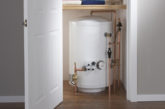
Don’t throw more of the problem at the problem and expect the problem to go away, says Rob Berridge.
So by March 2021, in just six short months, around two billion quid of our money is going to have been given back to us by our government to improve our building efficiency. Or to put it another way, some of our dwindling tax monies will have been spent bringing a very small percentage of our homes up to a slightly higher standard that, frankly, any builder (given the clear demands of government regulation over the last 50 years or so) would have achieved at construction point!
Of course, this will all be sold as a political success and ‘didn’t we do well?’, and I guess that a little bit is better than the decades of doing nothing at all. If that is the case, and pragmatism still has some trousers to wear, why do I feel like a short-trousered kid who’s dropped the top off his ice cream, bent down to pick it up (three second rule) and got stung on the posterior by a pin-striped wasp?
Am I jesting? Sure. Am I frustrated? You bet! £2 billion is no laughing matter but I would argue it is a mere ‘warm glove on the hand’ to the continuing wastage crisis that I have been banging on about for too many years now – and can only really affect three to four hundred thousand of our approximate 24 million leaky homes. In fact, a recent European study found that UK homes performed the worst in Europe, losing an average of 3°C every five hours – with Scandinavian countries only losing around 1.5°C in the same test time. Sorry, based on what I’ve just written and the scale of our problem, £2 billion is a huge joke rather than a laughing matter.
‘Heat energy is never required unless you are cold!’ By cold, I mean you are losing that heat somehow. Of course there are many interpretations to that statement but within our industry, and within the minds of people far more intelligent than me (apparently), the decisive goal is to do exactly what our parents and grandparents told us to do years ago whilst camping on holiday: ‘put a jumper on, you’ll catch your death!’ Somebody please tell me where our successive governments’ (parents and grandparents) common comprehension was on this when generational understanding of heat loss gave every one of us the sense to do exactly that? Put simply, why weren’t they listening then and why are they now taking a bucket of water to a raging fire?
Ok, enough fooling around. Gas is cheap at around 4p per kW/h. Plus, it is one of the most versatile and forgiving fuels, works to a fashion even if its relating plant is massively oversized within a project (don’t get me started) and absolutely has a significant part to play in the next 20 years of our energy future if it’s managed and calculated well. I will leave gas there as it’s been a nice day and I’d like to move on to higher efficiency gains.
The Green Homes Grant will allocate up to £10,000 for qualifying projects and this will include heat pumps, solar thermal, insulation upgrades, windows and so on. Heat pumps are absolutely brilliant these days and can give efficiencies of up to around 400% whereas gas boilers (even at factory efficiency) can offer up to around 95%. Couple this with the fact that the average UK heat requirement is between 6 and 8kW, and heat pumps are absolutely an option for the majority of even leaky homes.
However, and I say this with heavy heart, don’t throw more of the problem at the problem and expect the problem to go away. Don’t embark on a crusade to take perfectly good systems out of dwellings in the vague hope that you will win in the emissions game, you won’t! Very careful and impartial assessment should be sought before ripping out perfectly good systems and replacing them with new, highly trendy technology. Couple this with pipework design as most heat pump installations cannot simply replace gas boilers without very careful pipework calculations. Failure to do this is common. In fact, many installations that should have saved clients on their energy bills and emissions have indeed had the opposite effect, purely because calculation was not carried out.
We need not embark on just throwing this £2 billion at our homes blindly. We must have sound, thoughtful and accurate assessment of a building’s performance. Only then can the best recommendations be given on efficiency upgrades. As discussed, this pitiful sum will not go far and so all the more reason to spend it wisely.
I’m quite buoyant about the future of our awakening industry, even if it’s a little turbulent as it rises from its own slumber. All the people I speak to, in a variety of industry disciplines, share the same positivity about what we can do to improve efficiency and how, whilst there will always be resistance, a new age of understanding and technical willingness to learn is finding a coherent voice amongst the wider industry community.
We therefore need not simply replace perfectly good plant that can give years more service and possibly take the full (up to) 10 grand to upgrade. We need to evaluate, calculate and spend a pittance in comparison and get our heating systems performing as they should. Sure, if you’re lucky enough to get some of the grant money, spend the rest on some new windows or insulation etc but please don’t waste everyone’s tax money on what is frankly a government vanity project in my opinion.
Savings are here now. The technology is here now. Stick a jumper on your home, as your grandparents might say. Get your heating properly calculated and set up and then watch as that £2 billion has a much wider effect on many more of our disgracefully built homes.













